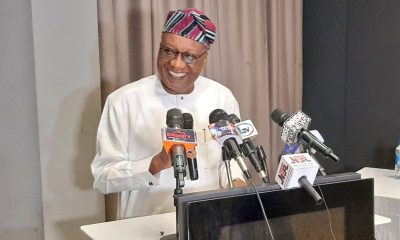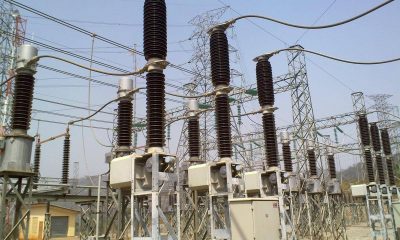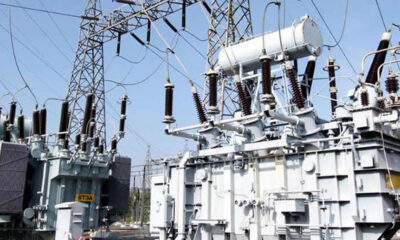Business
FG targets 4,500MW power supply, says recovery back on track

The Federal Government says its effort to improve power supply across the country is back on track after about two months of challenges that led to the collapse of the national grid three times within a month.
The government said it expected the grid to deliver a minimum of 4,500 megawatts of power daily.
The grid supply as at 1pm on Wednesday showed that 17 generation plants were delivering 3,072MW with Azura-Edo (393MW), Geregu Gas (390MW), Jebba Hydro (328MW), Egbin (317MW) and Kainji Hydro (303MW) among the top generators.
Speaking at a Power Sector Recovery Programme (PSRP) workshop for journalists in Abuja, the Chairman of the Nigerian Electricity Regulatory Commission (NERC), Sanusi Garba, said consumers would soon begin to see changes in electricity supply.
He noted that failure to review the tariff in the past threatened the viability of the sector, adding that now things were much better with services expected to improve.
He said, “The Federal Government initiated the PSRP with the support of the World Bank to achieve the goal of Nigerians having access to adequate, reliable and affordable electricity in Nigeria.
“Notwithstanding the electric power supply industry is now private sector driven, its relevance to economic growth and industrial development will require strategic government interventions. At this developmental stage, the industry’s challenges require that hands be on the deck to achieve an efficient and effective electric power supply industry that we desire for our economic development.”
He explained the objectives of the PSRP included the power sector’s financial viability; improving electricity supply reliability to meet the growing demand; to strengthen the sector’s institutional framework, and implement policies that promote and encourage investors’ confidence, and institutionalise a contract-based electricity industry.
He pointed that despite the challenges faced by the sector, “all the stakeholders involved in this power sector recovery programme are very much on track and are ready to do what we all need to do both in terms of financial performance by the distribution companies and the issue of the off-taker. I am not saying we are at the destination yet but at least the trajectory is looking upward and great promise for service delivery to Nigerian consumers.”
The NERC boss, who used the occasion to formally launch a new website for the PSRP, said the new portal would afford Nigerians the opportunity to access direct information about the sector and make comments on the services delivered by the operators.
Belije Madu of the PSRP Secretariat also explained that the PSRP’s new 4,500MW minimum grid supply was expected to have commenced at the beginning of the year, but had not been attained due to generation challenges.
He said the PSRP “includes a set of measures to ensure that a minimum 4,500MWh/hour of electricity is supplied to the distribution grid from 2022. This is the minimum level of supply necessary for grid stability and the reduction of system outage.”
Railway
NRC suspends Warri-Itakpe train after multiple engine failure

NRC suspends Warri-Itakpe train after multiple engine failure
The Nigerian Railway Corporation (NRC) on Thursday announced the suspension of its Warri-Itakpe train service, after it experienced multiple technical issues.
The standard gauge train was said to have broken down midway on Tuesday, creating some panic situation among passengers on board.
It said in a statement that the decision to suspend the train operation would allow its technical team “to conduct a full audit, resolve all identified issues, and restore safe and reliable service.”
The NRC statement signed by Henrietta Eregare of the NRC Public Relations Department, read in part, “The Nigerian Railway Corporation (NRC) wishes to inform the general public and our valued passengers that a significant disruption occurred on the Warri-Itakpe rail line on Tuesday, April 9, 2025, due to multiple technical issues involving a train engine failure.
“Management has consequently suspended train services on the route for 72 hours.
“The disruption commenced at approximately 1:38pm and affected both the 8am departure from Warri and the 2pm train from Itakpe.
“Emergency recovery protocols were immediately activated but also suffered a setback due to engine failures.”
It recalled how the corporation swiftly arranged for the safe evacuation of all passengers through road transportation with adequate security presence.
“Passengers were guided off the affected train to waiting cars approximately 500 meters from the track.
It stated, “Some Passengers chose to arrange their own transportation before the arrival of official recovery vehicles—a decision NRC understands given the delay.”
The corporation also disclosed that adequate arrangements had been made for a full refund of the value of tickets to passengers involved in the disrupted trains.
Those interested in using their tickets for future trips can take advantage of the revalidation option, according to the NRC.
“Refund and revalidation process is available on our online ticketing platforms, via our customer service lines, and at all NRC stations,” the statement added.
It expressed regret for the inconvenience caused by the unexpected disruption.
It said, “The Nigerian Railway Corporation takes full responsibility and is actively working to restore normal operations as quickly as possible. We remain committed to the safety, reliability, and comfort of our passengers.”
Business
BREAKING: Dangote Refinery slashes petrol price to ₦865

BREAKING: Dangote Refinery slashes petrol price to ₦865
The Dangote refinery has informed marketers and its customers of a downward review of its ex-gantry loading cost to ₦865 per litre.
The new price is N15 less than the facility’s previous price of N880 per litre sold Wednesday.
Our correspondent learnt that the refinery alerted its clients via a notification sent out on Thursday morning.
Our correspondent gathered that the Dangote refinery informed its customers in a notice sent out on Thursday morning.
Remember that marketers had exclusively informed that the 650,000-barrel Dangote refinery was expected to reduce its petrol loading costs by the end of this week, further adding to the decline in fuel prices.
Chinedu Ukadike, the National Publicity Secretary of the Independent Petroleum Marketers Association of Nigeria, reassured the public about the price drop while responding to the Federal Executive Council’s direction on the naira-for-crude arrangement.
Following an initial delay, the Federal Executive Council directed on Wednesday that the suspended Naira-for-Crude arrangement with local refiners be fully implemented.
It stated that the initiative with local refineries is not a temporary measure but a “key policy directive designed to support sustainable local refining”.
READ ALSO:
- Naira down to N1,620 in parallel market
- INEC names Sam Olumekun as acting chairman
- My daughter worked for Buhari for 5 years without pay – Buba Galadima
The Ministry of Finance announced this in a statement published on its official X handle titled “Update on the Crude and Refined Product Sales in Naira Initiative”.
The statement was released following a meeting on Tuesday between the Minister of Finance, Wale Edun, and representatives from Dangote Refinery, a major beneficiary of the agreement, to review progress and address ongoing implementation matters.
The committee stated that the policy is not a temporary measure but rather a long-term strategy to reduce Nigeria’s reliance on foreign currency for petroleum.
It further stated that the effort is not a one-time or limited intervention but rather a fundamental policy direction aimed at promoting sustainable local refining and bolstering energy security.
The statement read, “The Technical Sub-Committee on the Crude and Refined Product Sales in Naira initiative convened an update meeting on Tuesday to review progress and address ongoing implementation matters.
“The stakeholders reaffirmed the government’s continued commitment to the full implementation of this strategic initiative, as directed by the Federal Executive Council.
“Thus, the Crude and Refined Product Sales in Naira initiative is not a temporary or time-bound intervention but a key policy directive designed to support sustainable local refining, bolster energy security, and reduce reliance on foreign exchange in the domestic petroleum market.”
BREAKING: Dangote Refinery slashes petrol price to ₦865
Business
Naira down to N1,620 in parallel market

Naira down to N1,620 in parallel market
The naira yesterday depreciated to N1,620 per dollar in the parallel market from N1,575 per dollar on Tuesday.
But the Naira appreciated to N1,611.55 per dollar in the Nigerian Foreign Exchange Market (NFEM). Data published by FMDQ, showed that the indicative exchange rate for the naira fell to N1,611.55 per dollar from N1,612.24 per dollar on Tuesday, indicating 69 kobo appreciation for the naira.
Consequently, the margin between the parallel market and NFEM rate narrowed to N8.45 per dollar from N37.24 per dollar on Tuesday. Currency traders attributed the depreciation of the naira to increased demand and low supply factors.
READ ALSO:
- INEC names Sam Olumekun as acting chairman
- My daughter worked for Buhari for 5 years without pay – Buba Galadima
- Panic as 3 headless bodies found in Ondo river
Mr. Danjuma Sanni, a currency trader, told Vanguard that there had been a continuous increase in demand for the dollar, which intensified yesterday. “There has been increasing demand for the dollar with low supply. Though people still sell their dollars, the demand is still increasing more than the supply.
“Today, I bought a dollar at N1,600 and sold it for N1,620.
“This morning a dollar was sold at N1,650 and closed between N1,610 and N1,620.” The trader envisages the exchange rate to trade below N1,600 per dollar at the end of the week.”
Naira down to N1,620 in parallel market
-

 metro1 day ago
metro1 day agoWhy Obi’s 15-year-old supporter is in prison — Lawyer
-

 metro2 days ago
metro2 days agoNigerian woman admires polygamy, seeks co-wife for husband
-

 Entertainment3 days ago
Entertainment3 days agoGospel singer Kekere Jesu, fiancée, two others confirmed dead in Ogun accident
-

 Education20 hours ago
Education20 hours agoEasiest way to pass UTME, by JAMB registrar Oloyede
-

 metro1 day ago
metro1 day agoINEC names Sam Olumekun as acting chairman
-

 metro3 days ago
metro3 days agoNational grid: FG officially splits TCN, inaugurates NISO
-

 News3 days ago
News3 days agoAli Baba spills what Obasanjo told him on how to become Nigeria’s President
-

 Sports3 days ago
Sports3 days agoChampions League: Arsenal stun Real Madrid 3-0 as Rice delivers free-kick masterclass









